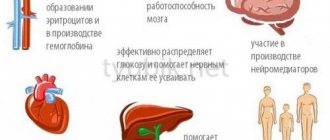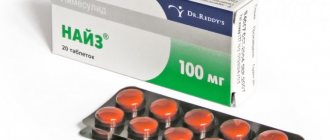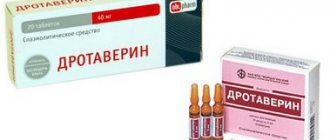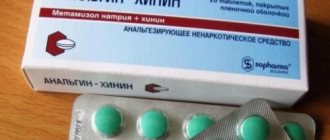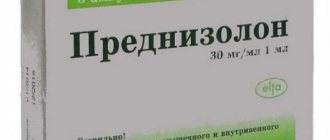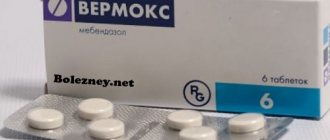Ibuklin is an anti-inflammatory, analgesic and antipyretic drug to eliminate the symptoms of colds and flu (sore throat, fever, headache and muscle pain), as well as fever and pain syndrome of various origins in adults and children. Ibuklin for children is the only combined low-dose drug approved in Russia for use in pediatrics.
Ibuklin: composition and release form of the drug
Ibuklin children's junior includes 100 mg of ibuprofen and 125 mg of paracetamol. The adult form of the drug contains more active substances: 400 mg and 325 mg, respectively. Clinical studies have revealed that it is the combination of these two drugs in ibuklin that provides a higher antipyretic effect than with monotherapy. The effect begins already from the second day after the start of use and reaches a maximum by the third day. This combination of drugs is offered to pediatricians as a first-line medicine for relieving high fever and eliminating pain in children on an outpatient basis.
Ibuklin for children is available in the form of pink, flavored tablets that must be dissolved in water. The package contains a spoon for obtaining a suspension. This medicine is not available in other forms. Tablets should be stored at a temperature of 15–25 degrees, in a dark place.
Pharmacological properties
Ibuklin is an anti-inflammatory drug that does not contain steroids. This is what distinguishes it from narcotic drugs, which can cause persistent addiction. Natural components are used as binding components - corn starch, talc and others.
In the instructions for using the drug Ibuklin for colds and flu, the manufacturer indicates the following important effects of the drug:
- Reduced pain;
- Decrease in temperature indicators;
- Complete elimination of the inflammatory process.
Ibuklin for children: instructions for use
Indications for the use of the drug as antipyretic therapy are all forms of high fever (t>39 degrees), regardless of age, as well as at temperatures up to 38 degrees for persons suffering from epilepsy, coronary artery disease or heart defects, with increased intracranial or blood pressure, hydrocephalus, diabetes mellitus, cancer.
In addition, indications for the use of ibuklin are:
- Acute muscle pain as a result of hypertonicity of muscle cells, which occurs due to heavy loads, injuries, a sedentary lifestyle, as well as infectious, inflammatory and chronic diseases.
- Neuralgia of any type.
- Pain in the joints and back, including with inflammatory diseases.
- Pain of a traumatic and post-traumatic nature (fractures, bruises, sprains and dislocations).
- Toothache.
- Pain during menstruation.
Ibuprofen is excreted mainly through the kidneys (90%) and also through bile. The peak concentration of the drug is achieved in 0.5-2 hours. Paracetamol can accumulate in the liver and is also excreted through the kidneys.
What does Ibuklin Junior help with?
If you don’t know what Ibuklin Junior helps with, be sure to read the instructions. This is a powerful anti-inflammatory and antipyretic agent. It is intended to reduce fever and relieve pain. Indications for use are as follows:
- headache of various etiologies;
- post-traumatic pain from sprains, bruises, dislocations, fractures;
- pain caused by the inflammatory process;
- toothache;
- elevated temperature;
- acute infectious and inflammatory lesions of the upper respiratory tract: laryngitis, pharyngitis, tracheitis;
- sinusitis and tonsillitis.
Ibuklin Junior tablets are a safe medicine that is suitable for treating very young children. In rare cases, it can cause liver dysfunction, an allergic reaction, or a decrease in glucose.
Ibuklin for children: instructions for use for children under 12 years of age
A generally accepted criterion among doctors for prescribing antipyretics to children is a temperature threshold of 38.5 degrees. When using such drugs, the following risk groups for complications are also taken into account:
- children under 2 months of age with a temperature greater than 38 degrees;
- children under two years old with a temperature of more than 39 degrees;
- children of any age with a temperature of more than 40 degrees;
- patients who have previously experienced muscle spasms;
- patients with central nervous system diseases;
- children with pathologies of the circulatory system;
- children with obstructive bronchial obstruction syndrome, accompanied by symptoms of suffocation (typical for children aged 1–5 years);
- children with genetically determined diseases leading to metabolic disorders.
Paracetamol is widely known under the trademarks “Efferalgan for children” and “Panadol baby”, ibuprofen - “Nurofen for children” in syrup; These drugs can be used as monotherapy from 3 months of a child’s life. Their combination in dosage form is ibuclin for children; The instructions allow its use in children from 3 years of age.
The maximum daily dosage of the drug ibuklin junior is as follows:
- for children aged 3–6 years (child weight 13–20 kg) - 1 tablet 3 times a day;
- children from 6 to 12 years old (weight 20–40 kg) - 1 tablet up to 6 times a day.
The tablet must be dissolved in a teaspoon of water before taking.
The combined use of paracetamol and ibuprofen allows you to achieve a more effective reduction in temperature at lower doses than using them separately. The drug has undergone several clinical studies in Russian children's hospitals.
The use of other analgesics (such as aspirin, analgin) in children under 12 years of age is not recommended. Acetylsalicylic acid, which is part of aspirin, can cause Reye's syndrome - a very dangerous disease in children 4-12 years old, causing liver damage, cerebral edema and coma. Prescribing analgin in children is justified only if there is an individual intolerance to paracetamol or ibuprofen, as well as if it is necessary to administer it intramuscularly or intravenously.
Analgin causes blood agranulocytosis, as a result of which the level of leukocytes decreases, the protective functions of the immune system are significantly weakened, and the body becomes susceptible to infectious diseases. With agranulocytosis, the mucous membranes and organs of the gastrointestinal tract are affected by deep ulcerations; an unfavorable course of the disease can lead to peritonitis, toxic shock and death. This drug is banned for use in 39 countries.
Therefore, the safest drugs for the treatment of febrile conditions in pediatrics are paracetamol and ibuprofen, as they cause the least number of complications.
Which pharmacies are best to buy price
| Pharmacy name | Price (in rubles) |
| Sage | 87 |
| FarmBusiness | 115 |
| Vita-Express | 91 |
| Farmland | 80,48 |
| Planet Health | 99 |
| Pharmacies 03 | 100 |
| Pharmacy 16 | 78,2 |
| Our pharmacy | 105 |
| SanPharma | 119 |
| Aliya | 105 |
Ibuklin junior
| Name of the drug, release form, packaging | Price (rubles) |
| Ibuklin Junior, 10 tablets | 71-100 |
| Ibuklin Junior, 20 tablets | 109-183 |
Attention! The information presented in the article is for informational purposes only. The materials in the article do not encourage self-treatment. Only a qualified doctor can make a diagnosis and give treatment recommendations based on the individual characteristics of a particular patient.
Ibuklin: instructions for use - tablets for children over 12 years of age
The drug is prescribed in an adult dosage of 1 tablet per day. The tablet is taken orally (there is no need to prepare a suspension), it should be washed down with water. The medication is taken before meals or 2-3 hours after it.
Acetylsalicylic acid is allowed to be used for children only from the age of 15 years, since it has a very aggressive effect on the digestive organs, causing their irritation and the formation of erosive and ulcerative lesions. This substance also reduces blood clotting, increasing the risk of bleeding and fragility of blood vessels.
For children of all ages, it is necessary to maintain a time interval between taking two tablets of at least 4 hours, and if the functions of the excretory systems are impaired (kidney or liver disease), then at least 8 hours. Ibuklin can be taken as an antipyretic for no more than 3 days, and as an analgesic for no more than 5 days. If symptoms persist, you should consult a doctor.
Characteristics of the drug
To understand when treatment with Ibuklin is necessary, you need to familiarize yourself with the main components of the drug.
The drug is available in tablets and contains 2 active ingredients:
- Ibuprofen . Belongs to the group of NSAIDs and has anti-inflammatory, antipyretic and analgesic effects.
- Paracetamol . Helps quickly eliminate hyperthermia, enhance the effect of ibuprofen on the body, and have a moderate analgesic effect.
Ibuprofen is available for children and adults, and the medicine for a child contains less active substances.
Analyzing the qualities of the main components, we can conclude that Ibuklin will help with diseases that are accompanied by fever, pain or inflammation.
Contraindications
Contraindications for ibuclin are determined by the limited use of its components:
- paracetamol - it cannot be used for severe diseases of the kidneys (insufficiency with creatinine clearance <30 ml/min), liver and hematopoietic organs; as well as with deficiency of the enzyme glucose-6-phosphate dehydrogenase, leading to hemolytic anemia - rapid destruction of red blood cells in the blood; with hyperkalemia; with a combination of bronchial asthma, nasal polyposis and intolerance to aspirin, as well as other non-steroidal anti-inflammatory drugs; with individual sensitivity;
- ibuprofen - its use is prohibited in case of exacerbation of erosive and ulcerative diseases of the gastrointestinal tract (gastric and duodenal ulcers, bleeding) and pathology of the optic nerve. Combined use with proton pump inhibitor drugs (omeprazole, Nexium and others), which reduce the production of hydrochloric acid, can significantly reduce the risk of complications for the gastrointestinal tract.
The drug is prescribed to patients under the supervision of a doctor for heart disease, diabetes, brain diseases associated with cerebrovascular accidents, long-term use of non-steroidal anti-inflammatory drugs, viral hepatitis, infectious diseases and other serious illnesses. Ibuklin should not be taken together with other non-steroidal anti-inflammatory drugs.
Analogs
There are a number of analogues of Ibuclin Junior on the market, combining the same active ingredients - ibuprofen and paracetamol, and aimed at reducing temperature, relieving symptoms of fever and reducing pain of various etiologies. Let's consider them according to the main parameters: composition, release form, age limit and price.
| Name of medicine | Active ingredients | Release form | Age limit | Price (in rubles) |
| Brustan Ranbaxy Laboratories Ltd. (India) | Ibuprofen, paracetamol | Tablets for oral use | Children's age up to 12 years | 108-150 |
| Brufica Plus Higlance Laboratories Pvt. Ltd. | Ibuprofen, paracetamol | Suspension | Children under 2 years old | 340-345 |
| Next, Pharmstandard, Russia | Ibuprofen, paracetamol | Tablets for oral use | Children under 12 years old | 88-157 |
| Nurofen Long, Reckitt Benckiser, UK | Ibuprofen, paracetamol | Tablets for oral use | Children under 12 years old | 161-302 |
| Khairumath, Highglans Laboratories Pvt. Ltd, India | Ibuprofen, paracetamol | Tablets for oral use | Children under 18 years old | 170-225 |
If there are contraindications to the components of Ibuklin, the doctor prescribes other medications. You can order in a pharmacy chain or buy analogues of the drug in an online store from a catalog. To relieve fever, lower body temperature, and eliminate pain, the following drugs are used:
- Ibuprofen Junior (Ibuprofen Junior);
- Brustan;
- Nurofen;
- Next;
- Khairumat;
- Ibuza;
- Spondifen.
Side effect of the drug
The most common side effects are gastrointestinal disorders (abdominal pain, heartburn, nausea, vomiting). The frequency of such manifestations is approximately 1 case per 100 patients and is mainly due to the fact that functional disorders of the gastrointestinal tract were already observed before taking the drug. In rare cases, the following side effects are possible:
- from the nervous system: dizziness, headaches, optic neuritis, depression, hallucinations, ringing in the ears;
- from the cardiovascular system and hematopoietic organs: increased blood pressure, heart failure, edema; anemia, thrombocytopenia, thrombocytopenic purpura, agranulocytosis, leukopenia;
- from the respiratory system: exacerbation of asthma, bronchospasm, shortness of breath;
- from the gastrointestinal tract: flatulence, constipation, formation of erosions, bleeding:
- from the liver: hepatitis, jaundice, necrosis, failure and encephalopathy;
- from the urinary system: nephrotic syndrome, renal failure;
- allergic reactions: Quincke's edema, skin rash, hyperhidrosis, purpura, photosensitivity;
- from the organs of vision: visual disturbances.
To reduce the risk of side effects, it is necessary to strictly adhere to the dosage of the drug.
Indications for use
Ibuklin can be taken from the age of 3 years. It is most often prescribed:
- to relieve high fever in acute respiratory infections;
- in order to reduce pain in dental and joint pathologies, headaches, and traumatic injuries.
Giving Ibuklin to a child from the age of three should be done very carefully. Adults should carefully monitor the baby’s condition and contact a pediatrician if there is the slightest change in his health.
When taking Ibuklin, young children may experience:
- dyspepsia - disorders of appetite, digestion, nausea, vomiting, stool disorders;
- dizziness, overexcitation, poor sleep;
- allergic reactions - rash, itching, swelling, skin hyperemia, bronchospasm.
Hexoral or ibuclin - which is better?
Hexoral Tabs are lozenges intended for use for stomatitis, pharyngitis, sore throat and other infectious and inflammatory processes in the mouth and throat. Contains: chlorhexidine dihydrochloride, benzocaine, menthol, peppermint oil, thymol. Provides antibacterial effects, reduces pain in the throat and mouth.
It is recommended to begin therapy immediately when symptoms appear and continue for several more days after they have resolved. Children over 12 years of age and adults are prescribed to dissolve 1 tablet every 1-2 hours, but do not exceed the dose of more than 8 pieces. within 24 hours. Children 4-11 years old should not drink more than 4 pieces. per day.
Contraindicated for:
- ulcers or sores in the mouth;
- intolerance to the components of the drug;
- a small amount of cholinesterase in the blood;
- children under 4 years of age.
Rarely, negative reactions may occur such as numbness of the tongue, loss of taste, discoloration of the teeth and tongue, which quickly passes, allergies with high sensitivity to benzocaine, methemoglobinemia in childhood. Should not be taken by people suffering from phenylketonuria.
Table - existing forms of the drug Hexoral with prices *
| Name | Manufacturer | Active substance | Price |
| HEXORAL 0.1% 200ML FLAC R-R | Famar Orleans | Hexethidine | 257.60 RUR |
| HEXORAL 0.2% 40.0 AEROSOL /4 NOZZLES/ | Famar Orleans | Hexethidine | RUB 311.30 |
| HEXORAL 0.2% 40.0 AEROSOL | Famar Orleans | Hexethidine | 276.90 RUR |
Price/efficacy/safety ratio of ibuklin. Different opinions
Ibuklin, which contains ibuprofen and paracetamol, is one of the most effective drugs used as symptomatic therapy. Thus, ibuprofen has been widely used since 1969 around the world and is in significant demand. Initially, its synthesis was driven by the desire to reduce the side effects of other non-steroidal anti-inflammatory drugs (especially aspirin and indomethacin), such as gastrointestinal disorders.
According to the results of a study conducted by scientists from the UK in 2010, the purpose of which was to determine the relationship between characteristics such as price, effectiveness and safety of ibuprofen, it was determined that this drug is the safest non-steroidal anti-inflammatory drug.
In addition, this component of ibuclin is recognized as the most common non-steroidal anti-inflammatory drug in the world. The active ingredient ibuklin, such as paracetamol, has also been recognized as quite effective. However, paracetamol is often accompanied by numerous side effects, including liver dysfunction. A particularly big problem is an overdose of paracetamol, which is accompanied by severe poisoning, which is based on the depletion of methionine, which neutralizes this substance.
Ibuklin's analogs
Ibuclin analogues are represented by a huge group of drugs, the main active ingredient of which is ibuprofen. However, instead of paracetamol, analogues of this medicine can use other components, which will also affect the properties of the drug. One of the most famous analogues of ibuclin, which is based on ibuprofen, is nurofen. This medicine was sold under this name for more than 30 years.
The trade names of ibuclin analogues include the following drugs: next, ibuclin junior, brustan, khayrumat, brufika. The main difference between these drugs lies in the different manufacturers of the drug, while the ratios of active ingredients in their composition differ insignificantly.
Storage conditions for Ibuklin
Storage conditions for ibuklin are determined by the manufacturer. The imposition of certain requirements for the transportation and storage of medicines is due to the desire to preserve the properties of the drug, which can change significantly and, thereby, significantly reduce the effectiveness of its action.
In most cases, storing ibuklin does not require the use of special refrigeration units or devices that regulate humidity. Thus, the most optimal conditions for preserving the properties of ibuklin are room humidity and a temperature of no more than 25 C.
Due to the fact that there is a possibility of adverse events when consuming an excess amount of the drug, ibuclin should be stored in a place inaccessible to the child.
Shelf life of Ibuklin
According to data provided by almost every manufacturer of ibuklin in Russia, the average shelf life of this medicine is about 5 years. However, this period is relevant only when storing ibuclin under the conditions specified in the instructions.
Conditions for release from Ibuklin pharmacies
The manufacturer of ibuklin does not classify the drug as a medicine that is sold in pharmacies under certain conditions. Thus, anyone can purchase ibuclin and its analogues, and no prescription is required.
The exception is the children's form of ibuklin, which is dispensed from the pharmacy by prescription. This is due to the fact that children need certain indications to prescribe this drug.
